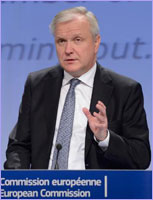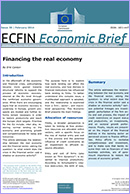|
|
|
|
|
|
 |
 |
 |
 |
Commission concludes in-depth reviews to identify macroeconomic imbalances and assesses fiscal consolidation
The European Commission has published its conclusions from in-depth reviews of 17 Member States’ economies, as part of the European Semester of economic policy coordination. The Communication published the same day on 5 March notes that the economic recovery is gaining ground but challenges remain. Among the challenges identified are the large external liabilities in some economies, persistent large current account surpluses reflecting subdued domestic demand in a few countries, and cost competitiveness for the countries that used to register the largest current account deficits and those experiencing large losses in export market shares. The Commission found that 14 of the Member States examined are experiencing imbalances which in three of these countries (Croatia, Italy and Slovenia) are considered to be excessive. Member States need to continue to address these imbalances in order to bring down the high levels of unemployment in many parts of Europe. The Commission also found that some Member States needed to step up fiscal consolidation if their deficit targets are to be reached. Both in the EU and in the euro area, however, the debt-to-GDP ratio is forecast to decline after reaching a peak in 2013. The Commission will present updated country-specific recommendations in June.
|
 |
 |
 |
|
 |
 |
 |
 |
 |
|
 |
 |
 |
| We hope to see a strong response from Member States and stand ready to support them in a constructive partnership for reforms to strengthen the recovery and lift job creation. |
 |
Olli Rehn, Vice-President for Economic and Monetary Affairs and the Euro
|
|
|
|
 |
 |
 |
 |
EU agrees on EUR 11 billion and other measures to aid Ukraine
The EU has agreed on a support package for Ukraine that includes EUR 11 billion over the coming years in financial assistance as well as other concrete measures. The comprehensive package announced by the Commission on 5 March was supported by European leaders at their extraordinary meeting on 6 March. It is part of the EU’s contribution to a European and international effort to support Ukraine’s economic and political reforms. Key elements of the package include EUR 3 billion from the EU budget in the coming years, EUR 1.6 billion in macro financial assistance, up to EUR 8 billion from the European Investment Bank and the European Bank for Reconstruction and Development and potentially EUR 3.5 billion leveraged through the Neighbourhood Investment Facility. A substantial amount of money is to be made rapidly available to help Ukraine address its immediate needs. The package also allows for provisional application of the Deep and Comprehensive Free Trade Area once an Association Agreement is signed, and includes a proposal to temporarily remove customs duties on Ukrainian exports to the EU even before an agreement is signed. According to Commission President Barosso, the package is “designed to assist a committed, inclusive and reforms oriented Government in rebuilding a stable and prosperous future for Ukraine.”
|
 |
|
 |
 |
|
 |
 |
 |
 |
Portugal’s adjustment programme: on track and better than expected
Staff teams from the European Commission, European Central Bank, and the International Monetary Fund (IMF) visited Lisbon during February 20-28 for the eleventh quarterly review of Portugal’s economic adjustment programme. The mission found that Portugal’s adjustment programme remains well on track. With GDP now expected to rise by 1.2% in 2014, economic growth is 0.4 percentage points ahead of projections, while the unemployment rate is projected to decline to 15.7%, a downward revision of 1.1 percentage points. The current account balance, which moved into surplus in 2013, is expected to improve further, and the 2013 budget deficit is estimated at 4.5% of GDP, well below earlier projections. Further structural reforms are needed, however, to continue the switch to an export-led growth model, and low profitability, high levels of corporate debt and financial fragmentation still pose challenges in the financial sector. Approval of the current review, which could take place in April, would allow the disbursement of EUR 2.5 billion (EUR 1.6 billion by the EU, and about EUR 0.9 billion by the IMF).
|
 |
|
 |
 |
|
 |
 |
 |
 |
Europe 2020: stock taking finds progress is mixed
Progress by the EU and Member States on meeting Europe 2020 targets has been mixed, according to the results of a stock taking exercise by the Commission. The results published on 5 March show that the EU as a whole is on track to meet or nearly meet its education, climate and energy targets, but due to the magnitude of the crisis, the EU is not on track to meet its employment, research and development or poverty reduction goals. Moreover, the picture varies significantly across countries. This spring, the Commission will launch an EU-wide public consultation to gather the views of all interested parties on how to develop the Europe 2020 strategy over the next five years. Europe 2020 is the EU’s strategy for long-term growth and jobs, launched in 2010. It is built on five targets (on employment, research, climate, education and poverty reduction) that EU Member States have agreed to meet collectively by 2020.
|
 |
|
 |
 |
|
 |
 |
 |
 |
ECB publishes manual for asset quality review as part of comprehensive assessment
On 11 March, the European Central Bank (ECB) published a manual for phase two of the asset quality review (AQR). The review is a key component of the comprehensive assessment of 128 major banks, which aims to enhance the transparency of bank balance sheets, trigger balance sheet repair when necessary, and rebuild investor confidence prior to the ECB taking over its supervisory tasks in November 2014. The manual contains a methodology for ten specific work blocks in “Phase 2” (on-site inspection) of the AQR. These include the review of processes, policies and accounting, credit file review and collateral value appraisal, and review of level 3 fair value assets. Risk weighted assets (RWA) of EUR 3.72 trillion, equivalent to 58% of total RWA across the banks, will be reviewed, as will an average of 1,250 credit files per bank. Results of the AQR will be incorporated in on going stress tests.
|
 |
|
 |
 |
|
 |
 |
 |
 |
Task Force for Greece- Sixth Activity: Stepping up implementation
The Commission's Task Force for Greece (TFGR) published its sixth activity report on technical assistance for Greece. The report released on 11 March notes that for the period of October 2013 to January 2014 important policy reforms have tangibly benefitted from well-targeted and resourced technical assistance. Progress in boosting the use of EU Structural Funds and helping the Greek authorities implement a wide range of reforms agreed in the context of the economic adjustment programme for Greece included improving tax administration, public financial management and the reform of the central administration. Technical assistance is also gathering momentum in other areas, including the completion of important transport links, continued modernisation of the healthcare system, and support for businesses and environmental projects such as improving the quality of water. President Barroso established the Task Force on 20 July 2011, after consulting with the Greek Prime Minister, to provide technical assistance to Greece. The initiative was supported by the European Council, and the Task Force for Greece (TFGR) started its work in October 2011.
|
 |
|
 |
 |
|
 |
 |
 |
 |
Euro area annual inflation stable at 0.8%
Euro area annual inflation is expected to be 0.8% in February 2014, stable compared with January, according to a flash estimate released on 28 February by Eurostat, the statistical office of the European Union. Looking at the main components of euro area inflation, the category food, alcohol & tobacco is expected to have the highest annual rate in February (1.5%, compared with 1.7% in January), followed by services (1.3%, compared with 1.2% in January), non-energy industrial goods (0.6%, compared with 0.2% in January) and energy (-2.2%, compared with -1.2% in January).
|
 |
|
 |
 |
|
 |
 |
 |
 |
Central securities depositories: Council confirms agreement with European Parliament
On 26 February, an agreement on behalf of the Council was reached with the European Parliament on new rules aimed at improving safety in the securities settlement system and at opening the market for central securities depositories (CSD) services. The draft regulation based on the Commission proposal of 7 March 2012 introduces an obligation to represent all transferable securities in book entry form and to record them in CSDs before trading them on regulated stock exchanges or other regulated market venues. It harmonises settlement periods and settlement regimes across the EU and introduces a common set of rules, inspired by international standards, which address the risks of CSD operations and services. As a result, CSDs will benefit from uniform requirements for licensing and an EU-wide “passport”, which will help remove existing market barriers. Adoption of the regulation by the European Parliament will allow the European Central Bank’s “Target2-Securities” (T2S) initiative to begin operating as planned in 2015. T2S aims to reduce settlement costs and improve financial stability by removing barriers across countries and harmonising systems.
|
 |
|
 |
 |
|
 |
 |
 |
 |
High-level group to study improvements to EU budget’s own resources system
A high-level group on own resources was formally established on 25 February by the Presidents of the European Commission, the European Parliament and the Council of the European Union. The group has been set up to study and suggest possible improvements to the current system of own resources that partly finances the EU budget. The main aim of the group is to explore ways to make the system simpler, fairer, more transparent and more democratically accountable. The decision to establish the group stems from the Commission's proposal in the Multiannual Financial Framework 2014-2020 for a more transparent and fairer system of financing the EU budget. The system was to be based on new proceeds generated from a financial transaction tax and a modernised value added tax. Chaired by former Italian Prime Minister and EU Commissioner Mario Monti, the high-level group will issue a first assessment at the end of 2014.
|
 |
|
 |
 |
|
|
|
|
|
 |
 |
 |
 |
Financing the real economy. Economic Brief 30.
This article addresses the relationship between the real economy and the financial sector, asking the question: to what extent does the crisis in the financial sector cast a shadow on economic activity? Various potential linkages are investigated, for example the efficiency of the firm entry and exit process and the impact of credit restrictions on export status and investments. The article concludes that policy efforts to revitalise competitiveness and investment, and to make sure that banks resume their role as financers of new business activity, are of paramount importance for restoring economic growth.
|
|
 |
|
|
|
|
|
|
|
|
|
|
|
|
|
|
|
 |
| Directorate-General for Economic and Financial Affairs |
 |
|